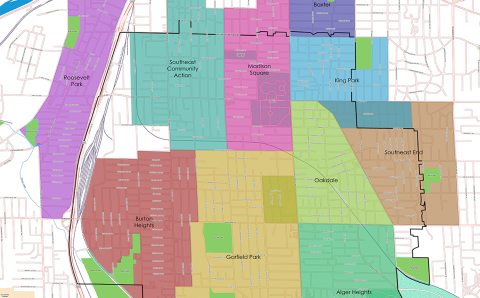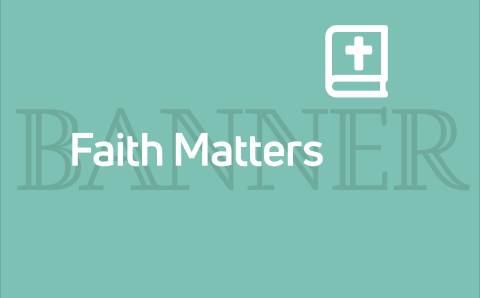At last year’s synod of the Christian Reformed Church, a group of delegates tasked with advising on some of the more difficult questions being considered nonetheless spoke of being truly thankful to do that work alongside brothers and sisters with whom they disagreed.
Eighteen men and five women were assigned to Advisory Committee 7. The committee was charged with crafting a response to 34 overtures (formal requests from churches and groups of churches) and two communications about human sexuality, then bringing that response before the larger body of synod for a vote. Most of the overtures either spoke against or offered support for Synod 2022’s decision to declare as confessional the inclusion of homosexual sex in the definition of unchastity in the Heidelberg Catechism.
These 23 people held varying personal opinions, and most were strangers to each other before synod. They knew that the topic of human sexuality had led to painful divisions in churches. They had firm opinions and were unlikely to be swayed. Yet in the three days or so that they spent together, these strangers grew to care for one another. They listened attentively and compassionately, even when what they heard clashed with their convictions. Their work was intense and demanding, but they listened well and—according to many in the room—they followed the guidance of the Holy Spirit. Chair Willem Delleman,a pastor from Victoria, B.C., claimed that serving on Committee 7 was “one of the best experiences of my life in terms of feeling God’s presence.”
As a Banner reporter to Synod 2023, I was permitted to sit in on their deliberations without reporting on the specifics. I was astonished by the atmosphere of cooperation in the room for the few hours that I sat with them.
I later interviewed eight people on the committee—Aaron Vriesman, Matthew Burns, Willem Delleman, Rita Klein-Geltink, Don Korthuis, Heather Strooboscher, Dave VanderMeulen, and Steve Zwart—to find out more about what worked so well in their committee. Because committee work at synod is not open, I cannot report on the details, but I want to share the overall effect of their work because it was so encouraging.
The committee presented much of its work in a unified report, with Delleman telling synod that “for two full days of deliberations we were unified.” The committee did split into a majority and a minority on the matter of the CRC’s position on homosexual sex as confessional, and once those differing reports came to the floor of synod, discussion was messy and painful. In the end, Synod 2023 voted in favor of the majority report that upheld the confessional stance.
Are there still things the Christian Reformed Church can learn from Committee 7? Here’s what I learned:
1. There is beauty in listening across our differences.
To discuss the things that divide us is uncomfortable. It is work that few of us relish. But in Committee 7, “people chose to heed the Spirit’s call to reach beyond what was familiar and think from someone else’s point of view [and] consider ideas that were uncomfortable or unfamiliar,” said Matthew Burns, a pastor from Whitensville, Mass. “There were many moments when someone said, ‘Wow, I’m really glad you said that.’”
“I was pleasantly surprised at how much compromise there was,” said Aaron Vriesman, a pastor from Hudsonville, Mich. “I would call it answers to prayer. I had been praying about synod a lot, and many others had [been] too.”
“We were able to find our way through weighty, contentious matters with a spirit of truly desiring to hear each other’s heart—not just listen to opinions, but truly hear each other’s heart,” said Steve Zwart, a pastor from Prinsburg, Minn., who brought the majority report before synod.
“There was joy in just working together,” said Dave VanderMeulen, a pastor from Escala, Calif. “It is so easy to pigeonhole people. I recognized in conversation that there is far more nuance than just Category One and Category Two. That was joyful. It was encouraging to not only find people that think alike but recognize how much we can continue to talk over a number of issues.”
2. “The ‘left’ listened to the ‘right’” and encountered a different side of discipline.
According to several of the interviewees, people on both sides of the same-sex marriage issue heard things from the other group that surprised them.
“What really happened is that the ‘left’ listened to the ‘right’ and the ‘right’ listened to the ‘left,’ really listening, seeing their perspective,” said Don Korthuis, an elder delegate from Lynden, Wash., who himself surprised many by joining the minority report. “The ‘left’ heard from the ‘right’ how they discipline people in their churches. Whenever you’re locked into a sin, there’s got to be discipline. It takes time—years. The ‘left’ thought discipline meant you kick them out of the church—boom, done.”
Delleman agreed that those who are affirming heard something unfamiliar: “Affirming folk needed a wake-up call and needed to get a sense of perspective of these conservative guys.” Delleman, a self-described moderate, was amazed “by the pastor and congregation member relationships (the conservatives) described. The pastor would say this or that, and the congregation would submit to what they were saying. I marveled at that, because where I am ministering, if I were to tell someone ‘You have to have your child baptized,’ they would walk. In that setting, wow, I kind of miss that.”
3. “The ‘right’ listened to the ‘left’” and saw the need for grace.
According to Korthuis, “The right realized that people need a little bit of grace, that there’s this pain out there.”
Vander Meulen, who was on the majority side, said he felt “huge sympathy” for “those who wrestle with these issues.”
“Hearing from people, talking about this, recognizing the weight behind all of this—we felt the burden when we were together behind those doors,” Vander Meulen said.
Burns said the conservatives were “genuinely surprised and taken aback to learn that there might be churches in the denomination that would use this confessional language as a bludgeon. They were primarily concerned with the need for us to examine our own hearts in this, not the need to go out with a bigger stick. I saw that posture, and I believe it.”
Heather Strooboscher, a pastor from Grand Rapids, Mich., said, “It surprised me that some people in the room had no idea of the unrest that last year’s synod caused. Many believed that last year’s synod was a good thing and didn’t cause harm to the churches.” Delleman agreed: “Folks from the Midwest rural churches were genuinely surprised and confused” by what they were hearing, he said.
“I don’t think anyone in the room would deny that people have been hurt, that mistakes have been made,” said Vriesman, but “some amount of hurt and disagreement is going to happen because of the gospel.”
On the floor of synod, Zwart pleaded, “If you’re going to vote for this majority report, please don’t leave here and be a jerk about it.”
4. We can stick by each other even when we disagree.
Although Committee 7 was divided, they wanted to convey to the general assembly the oneness they had achieved: “This was one of the best experiences many of us have ever had,” Delleman told synod.
Still, a few minority committee members felt strongly enough to speak on the floor against the majority report. Rita Klein-Geltink, a pastor from Cobourg, Ont., supporting the minority report, addressed fellow Committee 7 member Steve Zwart, who was at the microphone for the majority. She asked a question fraught with emotion: “If my four sons and their wives who are all following Jesus … fall into the category of unsure (about the permissibility of same-sex marriage), can the CRC still be their home?” As Zwart struggled with a slow, tearful response, another minority committee member, Katelyn Van Hove, an elder from Surrey, B.C., walked to the front of the room and put her arm on Zwart’s shoulder in an expression of unity.
Strooboscher said that on the synod floor “some comments were made at the mic, some at the sidebar, some muttered among the delegates, some from the gallery” that indicated there were some present “who did not respect the integrity and value of each and every person on the floor of synod.” But for her, “the integrity of Committee 7 carried through. Every time one of the committee members spoke, I was proud and felt affection for them. I was grateful for them and felt, ‘These are my people.’ I had a sense of family and unity.”
5. Some are still striving for unity in the CRC.
Jesus prayed that his church would be one as he and the Father are one (John 17:21). Committee members took that to heart.
“When we entered that committee room,” Zwart said, “I believe the Holy Spirit entered with us because the hearts of each person in that room were for what God wanted—unity. I believe each person genuinely wanted conclusions that declared ‘one Lord, one faith, one baptism.’ And despite differences that surfaced in the conversations and deliberations, the Spirit anointed the conversations as we sought the heart of what God wanted for his church—to be one.”
Strooboscher said she was bothered when outside her committee she heard people who seemed to have given up on a unified church. “There is a denominational defeatism,” she said.
And Korthuis said, “I felt the Spirit saying, ‘Can we hold the CRC together? Can this committee be the beginning of not splitting the church?’”
6. Our conversations must end in a decision.
Days of healthy conversation in Committee 7 ended with a decision, one that felt painful but inevitable to many. “In the end, there was a heavy weight to carry,” Vander Meulen said. “When the committee work was done, we sat and cried a bit. We felt the burden we had been carrying the whole time. We can’t carry the burden of trying to fix the denomination and hold it together. A lot of us would have loved to find that way.”
And as human sexuality was discussed on the floor of synod, “People were not making arguments for or against,” Burns noticed. “They were saying things like ‘I don’t recognize this church. I don’t know if I fit here anymore.’ These are identity things, nuances of belonging. It felt like some kind of divorce proceedings. People were acknowledging that they have some kind of irreconcilable difference. It felt like people on the floor were working out their grief over realizing that there are some pretty important things that they see differently.”
“I don’t see how unity can work out unless we don’t talk about (same-sex marriage) at all,” Vriesman said. “When trying to do ministry together, I don’t think you can do ‘unity at all costs.’ That’s why seven denominations have split over this, because on principle, staying together doesn’t work.” Vriesman said he felt sad and angry during the plenary discussions “because the reason we are here (at this point) is that we couldn’t be honest about our differences. … We have to have an emotional bloodbath.”
But Klein-Geltink, who also felt deeply discouraged by the tension-filled close of Synod 2023, said, “We spent three days deliberating and wrestling, and we still weren’t done. To say it’s all done is really naive. God has a lot more for us to learn and discover.”
7. The church reflects Jesus when we are full of grace and truth.
Committee 7 showed me a picture of grace and truth. Their conversation was full of grace. People listened to each other wholeheartedly and caringly. The truths of Scripture were applied to the church’s current situation as carefully as people knew how. Those in the majority saw how their churches could appear harsh and overbearing to those in the minority, and they recognized the need to soften their approach. Those in the minority realized that those in the majority did have tender, patient hearts that were willing to listen. They almost found a way to agree, and in the end they parted ways yet held each other in high esteem.
Committee 7 gave me a glimpse into a beautiful church: the Christian Reformed Church. These are people who hold a high view of Scripture and the confessions. These are people who love Jesus. They recognized that they have often failed to love as Jesus has called them to love, and, by God’s grace, they want to do better. They agree to abide by the decisions of the church even when those decisions are clearly at odds with the culture.
May tender, patient hearts and listening ears be the posture that the world sees as the beautiful, hurting Christian Reformed Church moves forward graciously and truthfully. The apostle John declared that Jesus Christ came from the Father “full of grace and truth” (John 1:14). May we, the bride of Christ, reflect God’s glory by likewise speaking the truth in love.
About the Author
Roxanne VanFarowe is a freelance writer who claims both Canadian and American citizenship and grew up in the Christian Reformed Church. She is a member of Blacknall Presbyterian Church in Durham, North Carolina.









